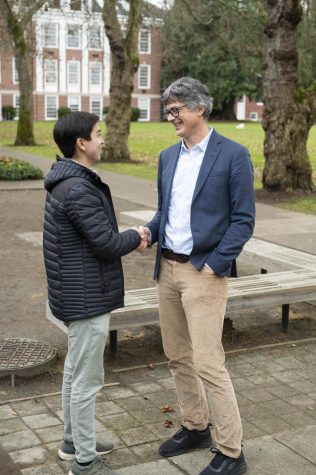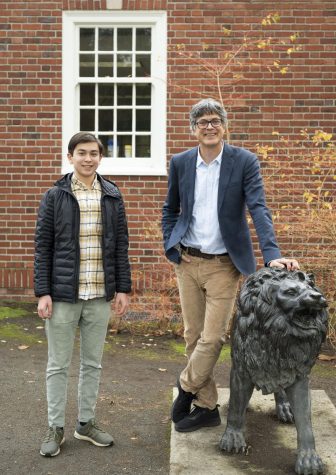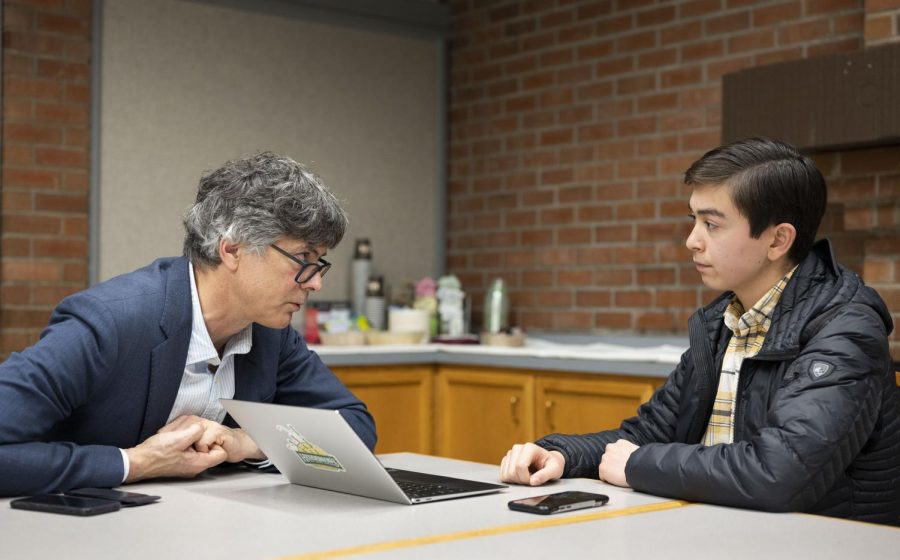The Tatler Interview: Dr. Per Espen Stoknes
Before addressing the Upper School at assembly on December 14, Dr. Per Espen Stoknes met with Paul M. ’26 to discuss economics, environment and equality. Dr. Stoknes is the director of the Center for Green Growth at the Norwegian Business School and holds a PhD in economics. He has published multiple books, including “Money and Soul,” “What We Think About When We Try Not to Think About Climate Change,” and “Tomorrow’s Economy.”
Paul M. ’26 (PM): Growing up in Norway, did you have a connection to nature that drove you to become an advocate for it?
Dr. Per Espen Stoknes (PES): I grew up on the northwest coast of Norway surrounded by ocean fjords and mountains and we were fortunate in that my parents inherited a wooden cabin in the mountains, so we would spend our vacations driving into the fjords and walking and skiing in Alpine country. That exposure to nature became a very important part of me. As a 20-year-old, I suddenly realized being in the mountains by myself is just amazing and then I knew I would work with the human relationship with nature.
PM: What drove you to look at climate change from a psychological point of view?
PES: I first got involved in climate activism in 2009 at a protest in Copenhagen, but after seeing how so many other people were not concerned about global warming, I decided to use my experience in psychology to dig into why the human brain struggles so much with taking in this knowledge in a rational way and acting upon it.
PM: What’s wrong with the dominant economic model and how does wealth distribution affect the climate?
PES: The main flaw in the economy is that it only recognizes value that is measured in dollars and does not recognize the value, for instance, of a songbird in the morning or being able to take a swim in a clear stream and drink from the river. In addition, the value of human trust doesn’t matter. If there’s distrust and polarization and conflict, it’s bad for business, but that doesn’t register as a loss of value. It registers as an increase in the value of lawyers and the money spent on conflict resolution. Only one type of value is counted while social and natural values become invisible. Capitalism is terrific at creating value but terrible at distributing it in a fair and productive manner.

PM: Is there a grand vision that you have that would address these issues of the environment and equality?
PES: That’s the main topic of my book, “Tomorrow’s Economy” — how can we address these issues in a way that’s good for business? I like business. I’ve been a businessman myself. I teach at a business school. But we need to shift from a narrow way of understanding growth to a broad way of understanding growth and recognize natural and social value in addition to financial value. Let’s say you maximize income by cutting down a forest — once the forest is cut down, there’s no more money to be made. You’ve converted a huge asset — a flourishing, thriving forest — into one flow of money. That’s good in the short term but not in the mid to long term. Expanding the way we think about value contributes to an overall greener and inclusive growth.
Happily, there are hundreds of thousands of people who share this passion across the world, and it’s entering investor circles. Now we have climate-positive companies, and this is rapidly becoming mainstream. Those of you who are students today will enter into a business environment and a new era of economics where these values are much more prominent, and mastering them will be key to your future career successes.
PM: Have you found that people can be moved to value the longterm over the short term, or can they only be persuaded to act when they see the immediate impact to an issue like climate change?
PES: This touches on a lifelong quest to explore whether humans are inevitably short term, or, put constructively, under what conditions will humans take action for the long term, which is the main question of my previous book, “What We Think About When We Try Not To Think About Global Warming.” There are four key takeaways.
One: rational facts aren’t enough for humans to be caretakers of the long term. We will have our cake now rather than having a cake in 2050, so scaring people with climate disaster in 2050 isn’t enough to make them take rational actions today. However, if you show people that it’s the social norm — we all get solar panels on the roof, we all shift to electric mobility and we all eat a bit less grain-fed red meat and more plant-based proteins — then you will do it too because you expect your friends will like you when you do it. This is how peer pressure can be a force for the long term.
Two: we can make climate-positive actions the default. We can nudge people towards climate-friendly actions, like picking a salad over red meat because when you’re at a buffet, you pass by the salads before you get to the meat.
After making it socially attractive and simple, we need to think about the green economy as a huge opportunity for American business to succeed in in competition with European and Chinese players, so you don’t lose out on this immense innovation wave that is coming in batteries, wind, solar, smart grid, smart houses — things that are required for a resource-productive future.
Finally, we need a new story, a narrative where we feel that “If I do something, I’m part of a community that is shifting towards regenerative practices and a safer world.” Humans are storytelling animals. We love stories, and if I have a story, I will have a glint in the eye when I get up in the morning, and I really want to get to work because I’m co-creating something that is valuable and worth having.

PM: How can schools nurture a sense of responsibility for the environment in their students?
PES: What about having classes outdoors? That was a very practical, low-key idea, but I think we should be teaching how humans are relational beings. The places you walked to when you are a kid become alive in your bodies. In a way, we carry the landscape with us. Schools can help create stories around the places, the nourishment, the plants, the animals that are alive in the places we teach and live. This nexus of connections between nature and culture becomes more prevalent in our minds so that we reduce the amount of separation between humans and nature that we’ve learned from classical Western culture.
We can provide experiences and knowledge to young people about how we are embedded in the worldwide ecosystem. By having that not just theoretically but as a collective experience with other students, schools can help to shift this pathological mindset that humanity is separate from the Earth. We’re much richer, wiser and kinder when we are fully conscious of how embedded, how entangled we are with the natural world.

